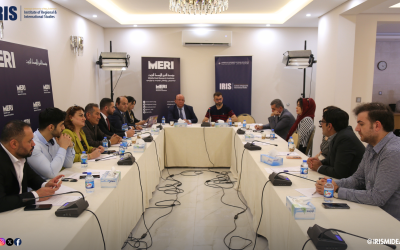On Sunday, November 4, 2018, IRIS Fellow and King’s College PhD candidate John Holland-McCowan, hosted a presentation and discussion about a recent report he published through the International Centre for the Study of Radicalisation at King’s College London, “The Kurds After the ‘Caliphate’: How the Decline of ISIS has Impacted the Kurds of Iraq and Syria.” He began with a brief history of major turning points in the recent history of the Kurds in Iraq and Syria. In Iraq in particular, he noted major developments in the Iraqi Kurdish struggle for autonomy, citing the no-fly zone imposed during the First Gulf War, the US-led invasion of Iraq in 2003, and constitutional provisions of autonomy in the 2005 constitution, all of which ultimately culminated in the Kurdish independence referendum of September 2017.
John contrasted the experience of the Iraqi Kurds with those of the Syrian Kurds, who did not experience significant levels of engagement with US and Coalition Forces until their defeat of ISIS in Kobane in 2015. At that point, they became valuable allies to the Coalition, given their military prowess and aversion to infighting with Syrian regime forces.
Despite Coalition engagement with the PYD in Syria and the peshmerga and other Kurdish security forces in the Iraq, he noted, the question of these forces’ continued roles in the aftermath of ISIS remained. The PYD’s decisive victories over ISIS proved the fighting power of the group, but also justified the disengagement of Coalition forces and increased PYD vulnerability to future attacks, similar to those they sustained during the Turkish military’s Operation Olive Branch. Likewise, the Iraqi Kurds’ pursuit of independence without the support of the US and much of the international community, paired with the decline of ISIS, left them susceptible to a loss of international support. John conceded, however, that in the case of both the PYD and the Iraqi peshmerga, the possibility for the reemergence of ISIS or other extremist movements could pave the way for continued cooperation with international forces.





